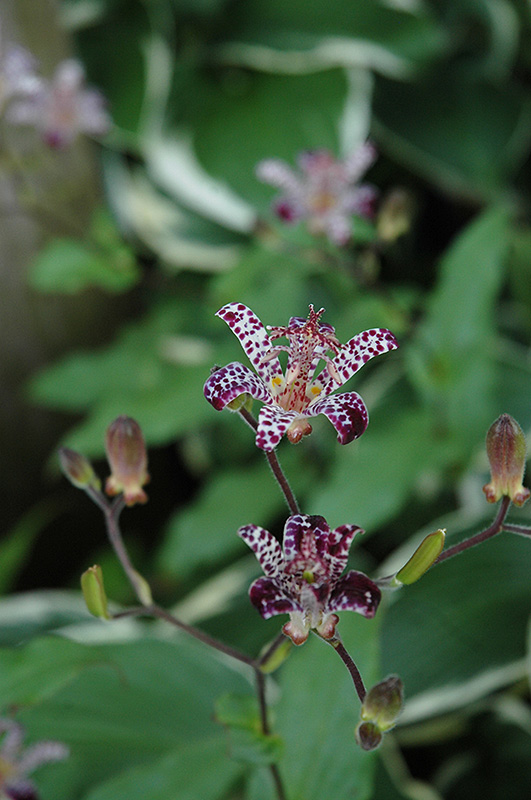>> Home
Height: 30 inches
Spread: 18 inches
Sunlight:
![]()
![]()
Hardiness Zone: 4
Other Names: Toadlily
Description:
This selection forms an attractive mound of green leaves; orchid-like flowers appear in early fall; plum purple spotting can become blotchy and irregular toward the petal tips; deserves a spot where it can be seen up close; excellent as a cut flower
Ornamental Features
Empress Toad Lily has white orchid-like flowers with purple overtones and plum purple spots at the ends of the stems from early to mid fall, which are interesting on close inspection. The flowers are excellent for cutting. Its heart-shaped leaves remain green in color throughout the season.
Landscape Attributes
Empress Toad Lily is an open herbaceous perennial with an upright spreading habit of growth. Its relatively fine texture sets it apart from other garden plants with less refined foliage.
This plant will require occasional maintenance and upkeep, and is best cleaned up in early spring before it resumes active growth for the season. Gardeners should be aware of the following characteristic(s) that may warrant special consideration;
- Spreading
Empress Toad Lily is recommended for the following landscape applications;
- Mass Planting
- General Garden Use
- Naturalizing And Woodland Gardens
Planting & Growing
Empress Toad Lily will grow to be about 24 inches tall at maturity, with a spread of 18 inches. It grows at a medium rate, and under ideal conditions can be expected to live for approximately 15 years. As an herbaceous perennial, this plant will usually die back to the crown each winter, and will regrow from the base each spring. Be careful not to disturb the crown in late winter when it may not be readily seen!
This plant does best in partial shade to shade. It requires an evenly moist well-drained soil for optimal growth. It is not particular as to soil pH, but grows best in rich soils. It is somewhat tolerant of urban pollution, and will benefit from being planted in a relatively sheltered location. Consider applying a thick mulch around the root zone in both summer and winter to conserve soil moisture and protect it in exposed locations or colder microclimates. This particular variety is an interspecific hybrid. It can be propagated by division; however, as a cultivated variety, be aware that it may be subject to certain restrictions or prohibitions on propagation.
